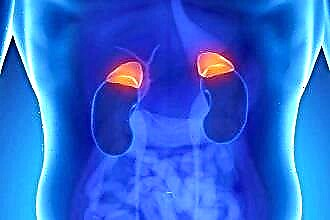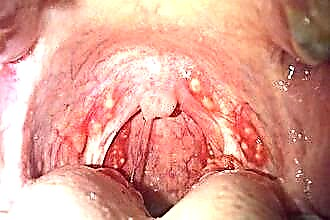There are many reasons that contribute to the persistence of inflammation in the nasopharyngeal mucosa after the patient has seemingly recovered. In this matter, everything depends on the level of immune protection, working conditions and the presence of a chronic infection in the ENT organs. How to cure a persistent runny nose in an adult? What drugs will help get rid of rhinorrhea in a short time?
 First, let's look at what can cause chronic rhinitis:
First, let's look at what can cause chronic rhinitis:
- deformed septum of the nose, anomalies in the development of this zone, traumatic changes in the structure of the nose. Any of the above factors can impair the permeability of air through the nasopharynx, disrupt the ventilation of the paranasal sinuses, which leads to the persistence of infection and inflammation;
- an allergic factor that lasts for several months. These can be allergies to pollen, household chemicals, cosmetics, perfume or chemical fragrances. Without stopping contact with the allergen, rhinitis cannot be cured.
If a person is allergic to plant pollen, it is recommended to start prophylactic treatment 2 weeks before the beginning of the flowering period.
- vasomotor rhinitis - associated with a dysregulation of the vascular wall tone. As a result, blood vessels lose their ability to adequately respond to environmental changes, as well as the influence of endogenous factors;
- infectious rhinitis - persists as long as pathogenic microbes are present in the nasopharynx. Often, chronic inflammation is observed with weakened immunity, the presence of an infection in the throat, adenoids, improper treatment of the acute period of rhinitis, or the addition of a secondary bacterial infection against the background of a viral disease;
- frequent colds, hypothermia lead to the constant presence of rhinorrhea;
- adverse environmental factors. This item applies to workers with hazardous working conditions, as well as people living near the industrial zone, major highways.
Symptomatic features
The variety of clinical signs of rhinitis depends on the cause that caused the disease. A person is often worried about:
 Difficulty nasal breathing;
Difficulty nasal breathing;- moderate mucous discharge of a watery or viscous consistency. An indicator of a bacterial rhinitis is a green or yellowish tinge of discharge;
- decreased pungency or complete absence of smell, as well as taste sensations;
- watery eyes, itchy eyes, conjunctival hyperemia, rashes and swelling are signs of an allergic rhinitis;
- nasal voice is constantly noted;
- dry nose, dry crusts - symptoms of an atrophic form. Blood streaks may occasionally be observed on the crusts, indicating damage to the superficial blood vessels.
Usually, on examination, cracks, hyperemia and peeling of the skin of the wings of the nose are found. With hypertrophic rhinitis, thickening of the mucous membrane is observed, with atrophic rhinitis, thinning. Frequent trauma to the mucous membrane with dry rhinitis leads to the formation of scars.
People with vasomotor rhinitis notice intermittent nasal congestion, sometimes in one nasal passage. Symptoms are aggravated by changes in body position, inhalation of cold air, or physical exertion.
Traditional treatment
How to treat a runny nose with pharmacy drugs? The therapeutic approach depends on the form of chronic rhinitis:
- with an infectious type, vasoconstrictor drugs for the nose (Xymelin, Evkazolin) can be prescribed in a short course, up to 5 days. Also used are drugs with protargol and an antimicrobial component (Isofra, Bioparox);
- in the hypertrophic form, drugs are recommended only at the initial stage. Treatment often consists in the use of laser therapy, ultrasound waves and cryodestruction of hyperplastic zones of the mucous membrane;
 with an atrophic form, it is necessary to constantly moisturize the mucous membrane from the inside and outside. This requires drinking plenty of fluids and the use of saline solutions (Humer, No-salt). It is especially important to use preparations based on oils (Pinosol). They envelop the mucous membrane, moisturize and protect it from irritation. Homeopathic remedies are also recommended, such as Delufen;
with an atrophic form, it is necessary to constantly moisturize the mucous membrane from the inside and outside. This requires drinking plenty of fluids and the use of saline solutions (Humer, No-salt). It is especially important to use preparations based on oils (Pinosol). They envelop the mucous membrane, moisturize and protect it from irritation. Homeopathic remedies are also recommended, such as Delufen;- treatment of allergic rhinitis consists in eliminating the allergen that constantly affects a person, as well as prescribing antihistamines. Of the nasal remedies, it is worth highlighting Cromolin, Nazaval, which can be used for a long course. Homeopathic nasal sprays (Delufen, Luffel) are also recommended. They can be used continuously, over a long course. From tablet forms, Zodak, Loratadin or Claritin are prescribed. In a severe course of the disease, the use of corticosteroid drugs (Nasonex, Fliksonase) is required. If necessary, specific immunotherapy can be carried out, during which the resistance of the immune system to the action of a certain allergen is developed;
- with the vasomotor type, it is advisable to use hormonal agents in the form of a nasal spray or injections. Of the surgical methods, laser, photodestruction, submucous vasotomy or coagulation can be used.
The main task in the treatment of a common cold is to eliminate its cause (allergen, infection, harmful working conditions).
Sinupret Forte can be used to improve the outflow of mucus from the paranasal sinuses, as well as to prevent the development of sinusitis. This is a herbal preparation that must be taken three times a day without chewing the tablet.
In some cases, a course of antibiotic therapy is required. Depending on the type of pathogenic microorganisms that support chronic inflammation in the nasopharynx, a specific antibacterial drug is selected. Before this, a microscopic examination of a smear from the nasal cavities is carried out and the seeding of nasal discharge on special media. With the help of an antibioticogram, it is possible to establish the sensitivity of microbes to drugs.
Traditional therapy
What if the runny nose persists? Constantly present nasal discharge and nasal congestion interfere with a person's communication, work, reducing the quality of life.
At home, you can prepare medicines that are widely used in the treatment of chronic rhinorrhea:
- saline solution for rinsing the nasal cavities. Cooking does not require material costs and much effort. It is enough to dissolve 10 g of food or sea salt in 480 ml of warm water and add 4 drops of iodine;
- aloe juice can be used as monotherapy or combined with other medicines, such as honey or garlic juice;
- inhalations can be carried out using chopped onions, garlic or horseradish;
- carrot or beetroot juice is used to rinse the nose;
- oils (essential eucalyptus, pine, olive) can be used for inhalation, making drops or medicines to lubricate the nasal mucosa.
To avoid the chronicity of the inflammatory process, it is necessary to timely treat an acute rhinitis and consult a doctor. To maintain an optimal level of immune defense, you need to eat right, avoid stress, hypothermia and do not forget about trips to the seaside.

 Difficulty nasal breathing;
Difficulty nasal breathing; with an atrophic form, it is necessary to constantly moisturize the mucous membrane from the inside and outside. This requires drinking plenty of fluids and the use of saline solutions (Humer, No-salt). It is especially important to use preparations based on oils (Pinosol). They envelop the mucous membrane, moisturize and protect it from irritation. Homeopathic remedies are also recommended, such as Delufen;
with an atrophic form, it is necessary to constantly moisturize the mucous membrane from the inside and outside. This requires drinking plenty of fluids and the use of saline solutions (Humer, No-salt). It is especially important to use preparations based on oils (Pinosol). They envelop the mucous membrane, moisturize and protect it from irritation. Homeopathic remedies are also recommended, such as Delufen;

